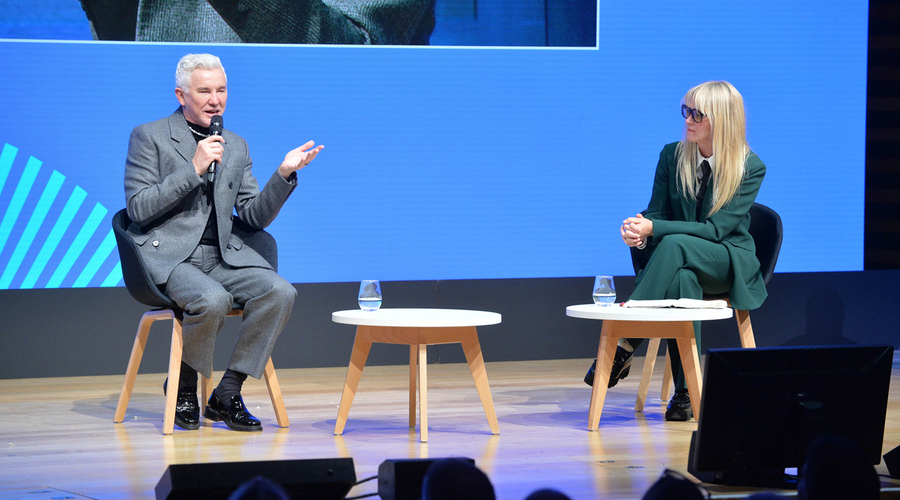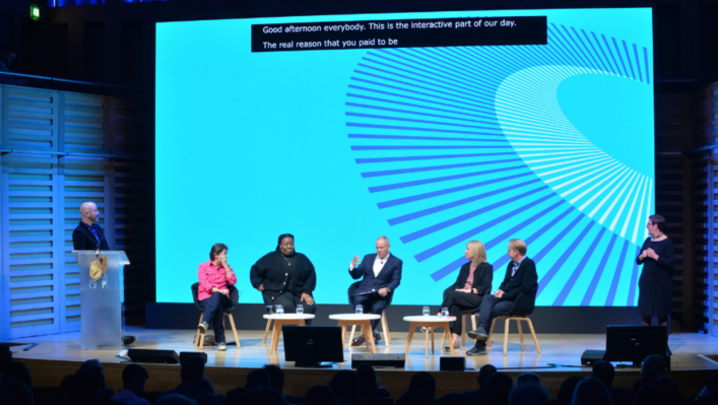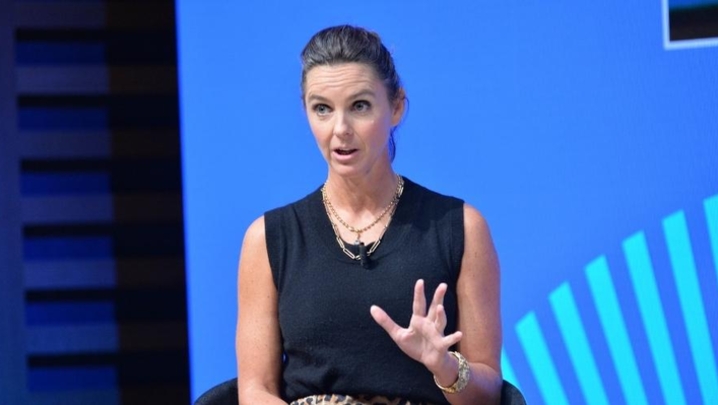Director Baz Luhrmann explains how he set out to tell an epic story even bigger than the musical legend.
Was the life of Elvis Presley the stuff of Shakespearean tragedy? Most emphatically it was, according to Baz Luhrmann, whose biopic Elvis this summer became the director’s biggest grossing UK film. It features Austin Butler as the singer and Tom Hanks as his manipulative manager, Colonel Tom Parker.
Luhrmann, clad as if he had just walked off a Milan catwalk, brought some genuine Hollywood stardust to the RTS London Convention. Within 12 minutes of setting foot on stage he almost won a standing ovation from the RTS audience as he recounted the tragic life story of the world’s first rock star, aka the King.
The director, camp, humorous and clearly enjoying being the centre of attention, told a potted version of Presley’s rise and fall: a teenager raised as a dirt-poor white Southerner living in a black neighbourhood in Memphis, “absorbing black music, country music,” then single-handedly inventing post-war teen rebellion and changing the lives of millions of people, including luminaries such as John Lennon.
“Elvis is the singing version of that. Oh my God, that becomes political, so the Colonel cuts his hair and makes him a family entertainer. Then he fights back and rebels again, goes back to Memphis. He’s free, makes the best music of all time,” Luhrmann continued with increasing fervour.
“Elvis is going to go round the world, it’s going to be a happy ending. But he’s caught in this trap – ‘I can’t get out because I love you too much’ – in this golden cage. You’re fired [he means the Colonel], he dies tragically. That is the perfect tragic American opera…
“You couldn’t write that stuff. I mean, you couldn’t, and I had to find a way of compressing it. I mean, whatever your version of God is, he’s a great storyteller.” Finally, the director, who was once an actor, drew breath as the audience applauded.
"The power of story was something I was aware of at a young age… I was quite a teller of lies"
Luhrmann is also a great storyteller, feted for such movies as Strictly Ballroom, Romeo and Juliet, Moulin Rouge! and The Great Gatsby. Unlike Presley’s parents, his were small-town business folk. His father owned a petrol station while his mum taught ballroom dancing and ran a dress shop.
He recalled growing up in a “tiny country town with about 11 houses” in rural Australia. There, he was involved in running a small theatre and “did everything from ballroom dancing to commando training”.
Luhrmann explained that he had only recently become aware that he was always “living with the currency of story and ideas… I was always making up stories, fantasy and all of that.
“Whether it was used to sell a perfume or to touch an audience or to convince in a nefarious way a whole nation to go marching into the nation next door, the power of story was something I was aware of at a young age…. I was quite a teller of lies.”
He added: “In a way, everything is fiction, even if you’re making documentary. If I did a documentary about Elvis and I had a billion cameras, I would still choose where to put the camera and that makes a difference. It’s someone telling [the story] and that goes for everything, including documentary. It’s someone’s point of view.”
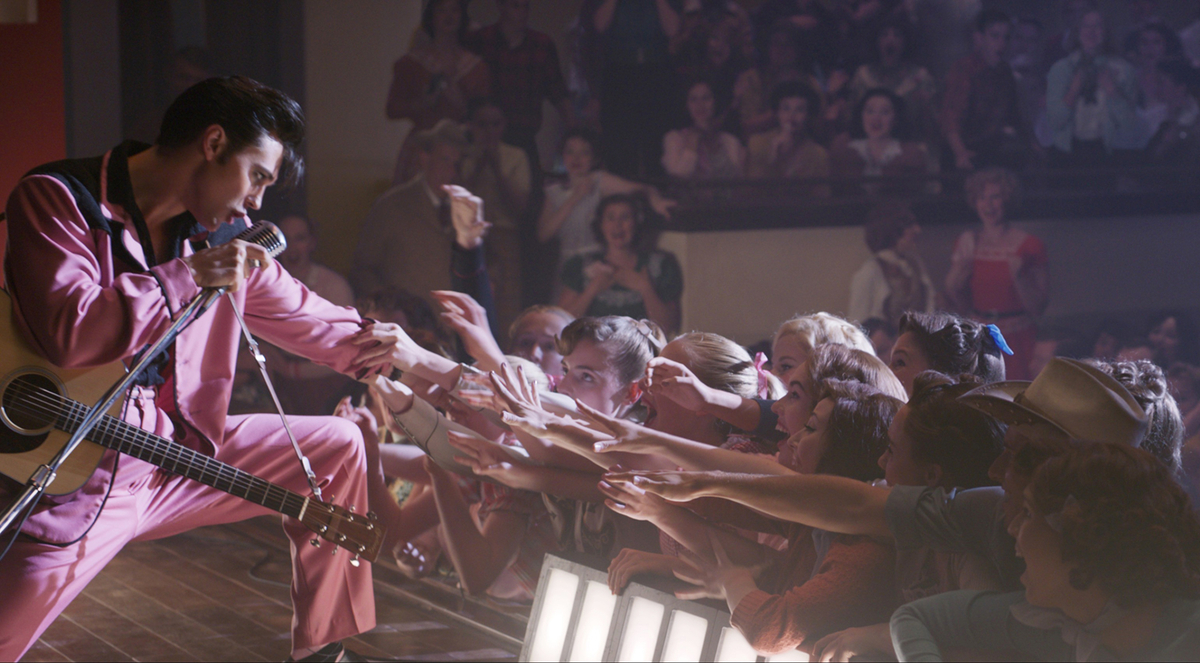
Interviewer Edith Bowman asked how his storytelling had changed over the years, from his first feature film, Strictly Ballroom, to Elvis? “I try and avoid too much self-analysis because you can get in the way of yourself, but I will tell you that in that small country town, we had a theatre, and we were getting second-run movies.
“Yes, there were Elvis matinees. But we also had this one black-and-white television, and we had the ABC [Australian Broadcasting Corporation] and what was then considered junky, no one cares movies…. My diet was of old classic movies from that period.” Citizen Kane and The Red Shoes were namechecked.
Luhrmann said the producers of what became Strictly Ballroom were reluctant to see him direct it. But the film succeeded after he ditched a script written by a professional writer and co-wrote the movie himself.
“Whether you like the films or not, it’s my language,” he said. “I don’t think I could do some of the films I love…. I could do it, a psychologically real film. But the way I tell movies is kind of the way I am.”
What was the catalyst for Elvis? “It wasn’t fandom. I was a fan, for sure, when I was a kid. When I was doing ballroom dancing, I used to say, ‘Play Burning Love because it’s sexy.’ He was present but I’ve always admired [him]. I’m not a Shakespearean scholar, but I’m a devoted fan of Shakespeare – the way he’d take a historical figure and explore a larger idea.”
The big idea that Luhrmann wanted to explore in Elvis was America in the 1950s, 1960s and 1970s, and that of “the grand salesman, where we’re moving towards this populism, where it’s all about someone putting a brand on something, at the same time as that other great American theme, the new.”
Bowman said that Luhrmann always seemed to manage to give actors the opportunity to do something they hadn’t done before and also introduce audiences to extraordinary new talent.
She cited Austin Butler as a case in point, and Alton Mason, who plays Little Richard. As for Tom Hanks portraying a baddie, namely Presley’s infamous gambling-addicted manager, the director said: “I can’t tell you how gargantuan the character of Colonel Tom Parker actually was.
“I had a privilege that no writer had. I had an office in the barn at Graceland for 18 months. All the stuff on Elvis is very well filed…. The Colonel used to tape himself a lot. I got to hear that…. I thought I really need a great actor to step up to the size of his character.”
He told the RTS that hiring stars was “normally a two-month dance” and so the director had prepared himself for weeks of persuading Hanks to take the role. He recalled his first approach: “I haven’t written the script. I’m ready for round one so I can get him interested in round two – but after 15 minutes, he says, ‘If you want me, I’m your guy.’”
Luhrmann continued: “He wanted to run towards doing a role that was repugnant. He wanted to do a character that his fanbase would not like to see him do because he is America’s Dad…
“The level of loathing of Tom Parker, the character in this movie, has something to do not only with Tom Hanks’ great representation of him. He manipulates and loves Elvis at the same time, which is why he is such a toxic character.
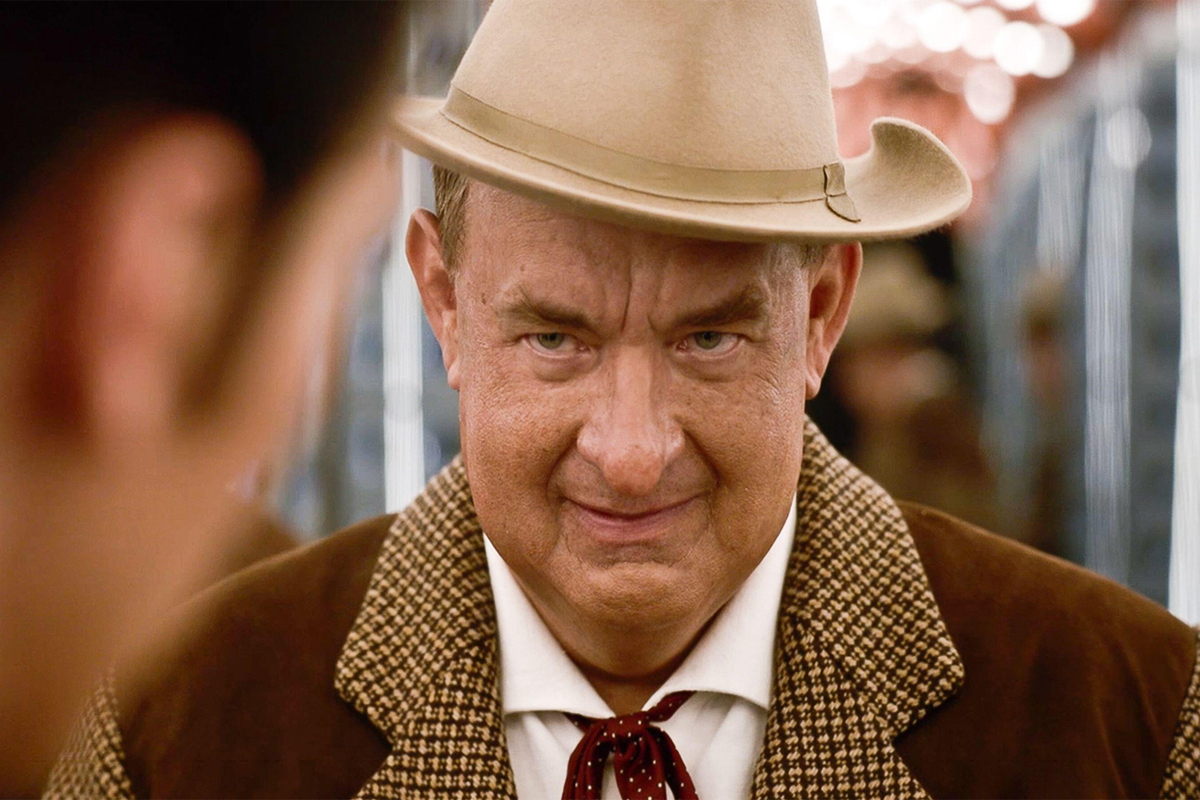
In the case of Butler, casting him as Elvis was the opposite of typecasting. “One of the great joys of what I do, is that every actor has more strings to their bow than they’ll ever get to play in their lifetime, and that’s a great frustration for actors because once they do something really well…”
In this context he is proud of getting Australian actor Bill Hunter, who was known for playing policemen, to do comedy; he plays Australian Dancing Federation President Barry Fife in Strictly Ballroom.
When it comes to finding new talent, Luhrmann said it usually comes from the last place you’re looking for it – “It’s going to hit you in the back of the head” – and tends to be where investment has occurred, be it in opera or popular culture. He gave the example of the rise of South Korea as a creative powerhouse. And, he said, “In the Milan opera, they invested in training early and in the young and I mean the very young. Down the road that pays intense dividends.”
Presley’s former wife, Priscilla, wasn’t sure that “a skinny kid” such as Butler could play the King but, when she saw a rough cut, she was totally convinced, telling Luhrmann: “Every breath, every move, if my husband was here, he’d say to Austin Butler, ‘Hot damn, you are me.’”
Luhrmann revealed that Butler had to be made a star – “or at least present in the culture” – before the film was released, which is “very hard to do”. TikTok proved pivotal in this respect, as did GQ magazine.
“I don’t do auditions, I do workshops, because the audition process is so demeaning,” explained Luhrmann. “Whoever walks in the room, I say to them, ‘My job is to get you the job.’ Not only that, whoever you are, I am going to work with you…. The first thing I say is, ‘How can we make this scene better?’
“With Austin, when he walked into my house, he was already down Elvis Street a bit. I forgot to tell him he had the role for about a year [audience laughter] because I was preparing him to be flexible…. He was Elvis 24/7. Denzel Washington told me: ‘You are about to meet a young actor whose work ethic is unlike any work ethic you have ever seen.’
“I thought he was just being nice, but I’ve never seen anyone…. He sings the whole first half of the movie as Elvis.”
The director added: “Elvis was no saint, but he was an extraordinary human being who was deeply, deeply spiritual. There’s a scene in the film, where, as a boy, Elvis is seen running with a group of kids to the gospel tent and the preacher grabs his hand.
“That scene was told to me verbatim by an 80-year-old African American man, Sam Bell, who passed away last year. I have it on video…. I came to understand something about Elvis that has never been identified before – that is, he was a deeply spiritual person.
“Even when he could barely stand up, he would sing gospel till the sun came up. He was only at peace when he was singing gospel. That inner life of his was the bit that surprised me. That’s why I ran gospel all the way through the film.
“He never called himself the King. He said Fats Domino was the King. Having said that, he was American royalty. He was an important part of American culture in that period and he’s important now, but he was somewhat relegated to a corner and maligned for a lot of things that simply weren’t true.”
In Session Nine, ‘In conversation with Baz Luhrmann’, the writer and director was interviewed by broadcaster Edith Bowman. The producer was Helen Scott. Report by Steve Clarke.

